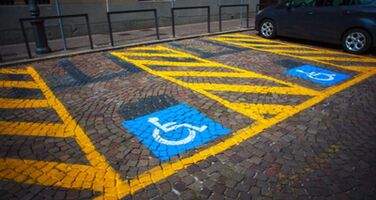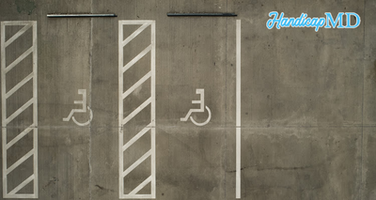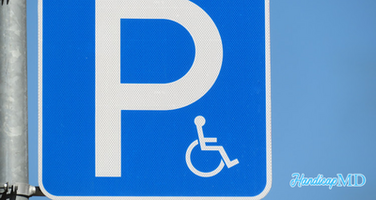
Disabled Parking Permit in Baton Rouge: How to Obtain and Use a Handicap Parking Permit
Accessibility is a cornerstone of an inclusive society, ensuring that individuals with disabilities can lead independent, fulfilling lives. Disability tags, also known as handicap placards or plates, play a crucial role in fostering this inclusivity by simplifying access to essential services, public spaces, and transportation. Obtaining and using a disability tag comes with numerous benefits, helping residents overcome mobility barriers and participate more fully in their communities. This article provides an in-depth guide on disability tags, covering eligibility, the application process, and usage tips in Baton Rouge.
What Is a Disabled Parking Permit?
A disability tag, often referred to as a handicapped placard or license plate, allows individuals with qualifying disabilities to access designated spaces and other privileges. These tags are issued to ensure equitable access to public spaces and services.
The Importance of Disabled Permits and Their Role in Enhancing Accessibility
Disability tags serve as a vital tool to facilitate access to reserved spaces, reducing the physical strain of navigating long distances to buildings or amenities. These designated spots are strategically located to minimize obstacles, such as stairs or uneven terrain, and ensure proximity to entrances and ramps. By granting priority access, disability tags enhance safety, independence, and convenience for individuals with mobility challenges.
Additionally, these tags promote social inclusion, enabling individuals with disabilities to engage in work, education, and recreational activities without unnecessary barriers. They also help raise public awareness about accessibility needs and foster a sense of shared responsibility for accommodating all members of society.
Benefits of Obtaining a Disabled Parking Permit in Baton Rouge
City residents with disabilities can benefit significantly from having a handicap permit. These benefits include:
- Convenient Access: Disability tags provide access to designated spaces across the city, including public venues, shopping centers, and healthcare facilities.
- Improved Mobility: With easier access to essential locations, individuals can reduce physical exertion and avoid potential health risks associated with long walks or navigating challenging terrain.
- Legal Protections: Disability tags safeguard individuals from fines or penalties for using designated spaces, ensuring their right to accessible spaces is upheld.
- Support for Caregivers: Caregivers transporting individuals with disabilities can also benefit from the tag, making trips more manageable and stress-free.
Eligibility Criteria
To qualify for a disability tag in Baton Rouge, individuals must meet specific criteria outlined by state law. The process typically requires medical documentation confirming a physical or medical condition that limits mobility or creates barriers to walking or moving long distances.
Key Eligibility Requirements:
- Mobility Impairments: Conditions such as the inability to walk 200 feet without rest, reliance on assistive devices (e.g., wheelchairs or walkers), or severe arthritis.
- Respiratory Conditions: Chronic obstructive pulmonary disease (COPD) or other lung conditions requiring portable oxygen.
- Cardiac Conditions: Certain forms of heart disease classified as Class III or IV by the American Heart Association.
- Visual Impairments: Legal blindness or significant vision loss.
Applicants must obtain certification from a licensed physician, chiropractor, or advanced practice nurse to confirm their eligibility.
Common Medical Conditions and Examples
While disability tags accommodate various conditions, some of the most commonly accepted include:
- Arthritis: Severe arthritis that restricts movement or requires assistive devices.
- Neurological Disorders: Conditions like multiple sclerosis, Parkinson’s disease, or cerebral palsy that impact motor skills.
- Amputation or Limb Loss: Partial or total loss of a limb that hinders mobility.
- Chronic Pain Disorders: Conditions like fibromyalgia or spinal stenosis causing severe, debilitating pain.
Different Types of Handicap Permits Available in Baton Rouge
City residents can apply for several types of disability tags based on their needs and circumstances:
- Permanent Tags: Issued to individuals with long-term or lifelong disabilities, these tags are valid for several years and must be renewed periodically.
- Temporary Tags: Designed for short-term conditions, such as post-surgery recovery or temporary injuries, these tags are typically valid for up to six months.
- Disability License Plates: Reserved for vehicles owned by individuals with disabilities, these plates provide the same benefits as tags but are permanently affixed to the vehicle.
- Disabled Veteran Plates: Available to veterans with service-connected disabilities, these plates honor their service while ensuring accessibility benefits.
Each type of tag requires specific documentation, such as medical certification or proof of military service, and an application through the state OMV.
Step-by-Step Application Process for a Disabled Parking Permit in Baton Rouge
Applying for a disability tag in Baton Rouge is a straightforward process when you follow the necessary steps:
- Obtain the Application Form: Visit the Louisiana Office of Motor Vehicles (OMV) website or a local OMV office to download or request the Application for Mobility Impaired Hang Tag (Form DPSMV 1916).
- Medical Certification: Have a licensed healthcare professional complete the medical certification portion of the form. This step verifies your eligibility based on the nature and severity of your disability.
- Complete Personal Information: Fill in your personal details, including name, address, and vehicle information if applying for a disability license plate.
- Submit the Application: Deliver the completed application to your local OMV office in person or mail it to the address provided on the form. Include any required supporting documents, such as proof of identity or vehicle registration.
- Await Approval: The OMV will review your application, and if approved, you will receive your disability tag, plate, or both.
Benefits of Using HandicapMD.com for Online Applications
HandicapMD.com is a trusted resource designed to take the hassle out of applying for disability tags. Here are the key benefits of using this platform:
- Convenience: With HandicapMD.com, you can complete the entire process from the comfort of your home, avoiding the need for in-person visits to government offices.
- Time-Saving: The platform eliminates long wait times by allowing users to submit their application, upload documents, and check statuses online.
- Error Reduction: The system provides step-by-step instructions, ensuring applicants avoid common errors that can lead to delays or rejections.
- Comprehensive Support: If you encounter issues, HandicapMD.com offers responsive customer service to guide you through the process.
- Accessibility: Designed with user-friendly features, the platform is intuitive and inclusive, making it easier for individuals of all tech proficiency levels.
By leveraging HandicapMD.com, city residents gain access to a modern, efficient solution tailored to their needs.
Walkthrough of the HandicapMD.com Application Process
Applying for disability tags through HandicapMD.com is straightforward. Follow these simple steps to complete your application:
Create an Account: Start by registering on the website with basic personal information. This ensures your details are securely stored and accessible for future reference.
Upload Necessary Documentation: Gather the required documents, such as proof of disability from a licensed medical provider and identification. The platform allows you to upload scanned copies directly.
Complete the Online Form: Fill out the online application with details about your disability and vehicle. The form includes easy-to-understand prompts and dropdown menus to simplify the process.
Submit for Review: Once you’ve completed the form and uploaded all documents, submit your application. HandicapMD.com will review your submission for accuracy and compliance.
Track Your Application: After submission, you can log into your account to track the status of your application. Notifications will alert you to any required updates or when your tag is approved.
Receive Your Tags: Upon approval, your disability tags will be processed and sent to you, completing the process without any need for in-person visits.
Why Applying Online is the Best Option
Applying online through HandicapMD.com offers several advantages compared to traditional methods:
- Eliminates In-Person Barriers: Avoiding trips to government offices is especially valuable for those with mobility challenges or demanding schedules.
- Reduces Stress: The online process minimizes paperwork and streamlines communication, making it less overwhelming.
- Speeds Up Approval Times: Digital applications are typically processed faster than physical ones, allowing you to receive your disability tags sooner.
- Eco-Friendly: Online applications reduce the need for printed forms, contributing to environmental sustainability.
- Available 24/7: You can work on your application at any time that suits your schedule, offering unparalleled flexibility.
For city residents, embracing this online solution means a faster, more accessible way to secure disability tags, ultimately improving mobility and quality of life.
Fees
Fees for city-issued disability tags depend on the type of tag you are applying for:
- Permanent Tags: Typically issued free of charge to eligible applicants.
- Temporary Tags: A nominal fee, usually $3-$5, may be required.
- Disability License Plates: Standard registration fees apply, although additional charges may be waived for qualified applicants.
- Disabled Veteran Plates: These are often exempt from registration fees, though applicants may need to provide proof of service-connected disabilities.
Always check with the state OMV for the most up-to-date fee information.
Validity and Expiration
The validity period of a city-issued disability tag varies depending on the type:
- Permanent Tags: Valid for up to four years, expiring on the individual’s birthday in the final year of validity.
- Temporary Tags: Valid for up to six months or as indicated by the healthcare professional’s certification.
- Disability License Plates: Valid for the standard vehicle registration period, usually one year, and must be renewed annually.
It’s essential to monitor expiration dates to avoid losing the benefits of utilizing accessible spaces.
Renewal Process
Renewing a disability tag is a simple process. Follow these steps to ensure uninterrupted access:
- Check Expiration Date: Review the expiration date on your tag or license plate to determine when to initiate the renewal process.
- Complete a Renewal Form: Obtain the renewal application form from the OMV website or office. In many cases, the original form used to apply for the tag can also be used for renewal.
- Medical Recertification (if required): For permanent tags or plates, medical recertification may not be needed unless specifically requested. Temporary tags will require updated medical documentation.
- Submit the Renewal Application: Return the completed form, along with any necessary fees or documents, to the OMV. This can usually be done in person, by mail, or online.
- Receive Your Renewal Tag: Once processed, you’ll receive your renewed disability tag.
Replacing Lost, Stolen, or Damaged Handicap Permits in Baton Rouge
If your disability tag is lost, stolen, or damaged, you can request a replacement by following these steps:
- Report the Incident (if applicable): In the case of theft, file a police report to document the incident. While not always required, this report can provide an added layer of accountability.
- Obtain a Replacement Form: Visit your local OMV or download the appropriate replacement request form from the OMV website.
- Complete the Form: Provide details about the original tag, including the type, registration information, and the reason for replacement.
- Submit Supporting Documents: Include proof of identity, any applicable police reports, and payment for the replacement fee (if required).
- Submit the Application: Hand-deliver or mail the completed form to your local OMV office.
Once processed, your replacement tag or plate will be issued.
How to Display Your Handicap Placard Correctly
Displaying your disability tag correctly is essential to ensure compliance with regulations and avoid penalties. Proper display also ensures that law enforcement and city authorities can easily identify your vehicle as authorized to use accessible spaces.
For Placards:
- Hang the tag from the rearview mirror inside the vehicle when parked.
- Ensure the tag's details (e.g., expiration date) are visible from outside the car.
- Remove the tag while driving to avoid obstructing your view.
For License Plates:
- Attach the disability plate to the rear of your vehicle as required by state law.
- Keep your registration paperwork in the vehicle for verification if requested by authorities.
Improper display, such as placing the tag on the dashboard or leaving it out of view, may result in citations or towing.
Using Your Baton Rouge Disabled Parking Permits in Other States
One of the benefits of a handicap placard is that it is recognized across all U.S. states under federal law. This means you can use your city-issued tag when traveling outside Louisiana.
Key Tips for Out-of-State Use:
- Check Local Regulations: Some states have specific rules about how and where disability tags can be used. Familiarize yourself with these to avoid unintentional violations.
- Proper Display: Ensure your tag is displayed correctly, as local authorities will use visual cues to confirm its validity.
- Respect State-Specific Markings: While accessible spaces are universally marked, additional symbols or color-coded signs may indicate different designations, such as wheelchair van spots.
When in doubt, consult the accessible lot’s signage or local regulations.
Penalties for Misusing Accessible Parking Spaces
Accessible spaces are reserved for individuals with disabilities to ensure their equal participation in daily activities. Misusing these spaces can have serious consequences, both legally and ethically.
Common Misuses Include:
- Accessing Spaces Without Authorization: Using an accessible spot without a valid disability tag.
- Improper Use of a Tag: Using someone else’s disability tag or continuing to use an expired or revoked tag.
- Blocking Access Ramps: Parking in a manner that obstructs wheelchair ramps or loading zones adjacent to accessible spaces.
Common Violations and Their Consequences
Misusing accessible spaces or tags can result in various penalties, including:
Fines:
- Fines for unauthorized use in an accessible space can range from $250 to $500, depending on the severity of the violation.
- Repeat offenses may result in higher penalties.
Vehicle Towing:
- Illegally parked vehicles may be towed at the owner’s expense.
- Retrieving a towed vehicle can add significant costs, including towing fees and storage charges.
Tag Revocation:
- Misusing a disability tag, such as loaning it to someone without a disability, can lead to its permanent revocation.
These measures are in place to deter abuse and protect the rights of those who genuinely need the acessible space.
Common Myths and Misunderstandings About Handicap Permits
Disability tags are often misunderstood, leading to misuse, misconceptions, and unnecessary stigma. Here are some of the most common myths and the facts behind them:
Myth: Disability Tags Are Only for Wheelchair Users
- Fact: Tags are issued for a variety of conditions, including respiratory and cardiac issues, severe arthritis, and temporary mobility impairments. Not all disabilities are visible.
Myth: Temporary Conditions Don’t Qualify
- Fact: Temporary tags are available for short-term conditions, such as recovery from surgery or injury. These provide necessary support during the healing period.
Myth: Family Members Can Use the Tag Without the Person with Disability Present
- Fact: Disability tags are issued for the benefit of the individual with the disability. It is illegal for others to use the tag when the eligible person is not in the vehicle.
Myth: Tags Grant Unlimited Privileges
- Fact: While disability tags provide access to designated spaces, they do not exempt users from time limits, meter fees, or other city regulations unless explicitly stated.
Myth: Anyone Can Apply for a Disability Tag
- Fact: Applicants must meet strict medical criteria and provide certification from a licensed healthcare professional to qualify.
What is Disabled Parking?
Disabled parking refers to designated spaces reserved for individuals with disabilities who face challenges in accessing standard spots due to mobility impairments or other medical conditions. These spaces are marked with clear signage and symbols, such as the International Symbol of Accessibility (wheelchair icon). This ensures that individuals with disabilities can safely and conveniently access buildings, services, and public spaces.
Features of Designated Parking Spaces
Accessible spaces are designed to accommodate the needs of individuals with disabilities. Common features include:
- Proximity to Entrances: Spaces are located close to building entrances, ramps, and elevators to minimize travel distance.
- Extra Space for Accessibility: Most spaces have adjacent striped access aisles to provide room for wheelchair lifts, walkers, or other mobility aids.
- Clear Signage: Signs prominently display the wheelchair symbol and may include penalties for unauthorized use.
- Surface Design: Spaces often have flat, smooth surfaces to prevent mobility challenges.
- Van-Accessible Spots: Some spaces are specifically designed for vehicles equipped with wheelchair lifts or ramps, offering extra width and overhead clearance.
These features ensure that accessible space is functional, safe, and inclusive for all who need it.
Tips for Using Accessible Parking Responsibly
Using accessible spaces comes with responsibilities to respect the rights of others and maintain fairness. Here are some tips for using these spaces responsibly:
- Always Display Your Disability Tag: Make sure your tag or plate is clearly visible to avoid fines or disputes.
- Use the Space Only When Necessary: If you don’t need to park in an accessible spot, leave it available for someone who does.
- Avoid Blocking Access Aisles: These areas are vital for wheelchair users and should remain unobstructed.
- Adhere to Time Limits: If a space has a time restriction, follow it to ensure availability for others.
- Educate Family Members: Make sure everyone who drives your vehicle understands the rules for using your tag properly.
Encouraging Others to Follow Regulations
Creating a culture of respect for accessible spaces begins with awareness and advocacy. Here are ways to encourage compliance:
- Lead by Example: Always use your disability tag responsibly and educate others on the importance of these spaces.
- Report Violations: Notify property management or local authorities if you see someone misusing accessible spots.
- Promote Awareness: Share information about the purpose of accessible spaces and the impact of misuse on individuals with disabilities.
- Advocate for Better Accessibility: Work with local organizations to improve accessible space availability and enforcement in your community.
By fostering understanding, we can ensure accessible spaces remains a vital resource for those who genuinely need it.
FAQs
1. How long does it take to get a disability tag?
The processing time varies, but most applications are reviewed and approved within 7–14 business days if all documents are submitted correctly.
2. Can I use my disability tag in private lots?
Yes, disability tags are valid in private lots that provide accessible spaces, though enforcement may differ depending on property management.
3. Do I need a new medical certification for renewing a permanent pass?
No, permanent passes typically do not require recertification unless explicitly requested by the OMV. Temporary passes, however, do require updated medical documentation.
4. Can I apply for a disability tag online?
While the state OMV does not currently offer an entirely online application process, you can access forms online and submit them via mail or in person.
5. What should I do if my tag is stolen?
Report the theft to local law enforcement and submit a replacement request to the OMV with the necessary documentation.
Conclusion
Disability tags are vital for ensuring accessibility and inclusion for individuals with disabilities in Baton Rouge. By understanding the proper use of these tags and the importance of accessible spaces, we can create a community that values inclusivity and respects the rights of everyone. From applying for a tag to using it responsibly, the steps are simple but impactful in fostering a more accommodating society.
If you or someone you know qualifies for a disability tag, don’t delay in taking action. Visit HandicapMD.com to start the application process today. Their streamlined services and expert guidance can help you navigate the process with ease, ensuring you get the support you need to live independently and accessibly. Take the first step toward greater freedom and mobility—apply now!
.png)






